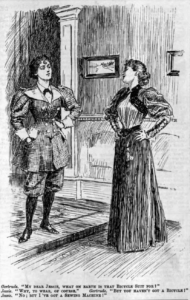
In The Picture of Dorian Gray, should Dorian be omitted from the blame for his participation in Sibyl Vane’s suicide? Is he clinically insane? Does he understand the awareness that his actions/thinking are wrong? The narrative this novel seems to hold is that Dorian genuinely believes he is a good person who has done no wrong (up until the point where he kills Basil). Dorian can feel emotions of ecstasy or elation when he is complimented and questions his, “secret pleasure, at the misshapen shadow that had to bear the burden that should have been his own” (Wilde 119). The dreamlike, detailed, and flowery language of this scene almost sets it up to be read as illusory, Dorian’s words can’t be trusted to reflect his honest emotions. Here we can notice a moment of slight remorse and guilt where Dorian acknowledges he is doing a wrong deed by not reflecting/working through his emotions. However, Dorian chooses to bury his emotions in the painting to deal with and rot.
The death of Sibyl paired with Dorian’s selfish wrongdoings physically alter the painting and marks the beginning of the end for Dorian. Dorian did feel slight remorse for Sibly initially on his own accord before speaking with Lord Henry about his conflicting feelings. Although Lord Henry was not present for Dorian and Sibyl’s last conversation, he sure does have a lot to say when relieving Dorian’s guilty conscience. Lord Henry reasons Sibly, “never really lived, and so she has never really died… don’t waste your tears over Sibyl Vane. She was less real than they are” (Wilde 89). ‘They’ meaning all the Shakespearean female lead characters she performed at the theater, such as Juliet, Ophelia, or Cordelia. Not only does Lord Henry dehumanize Sibyl to fictional characters, but he succeeds in relinquishing Dorian of any guilt for his wickedness towards Sibyl. What I really am trying to say here is: do these scenes illuminate a sort of ambivalence in taking a stance on whether Dorian is aware of the calamity of his actions in Sibyl’s death, and should he be absolved from them? The unreliable, hedonistic protagonist (+ antagonist?) demonstrates an ability to question his emotions but makes a conscious choice to bury them deep down. He can, at the very least, begin to understand his implication in Sibyl’s death before his best friend and idol, Lord Henry, guides him otherwise.
